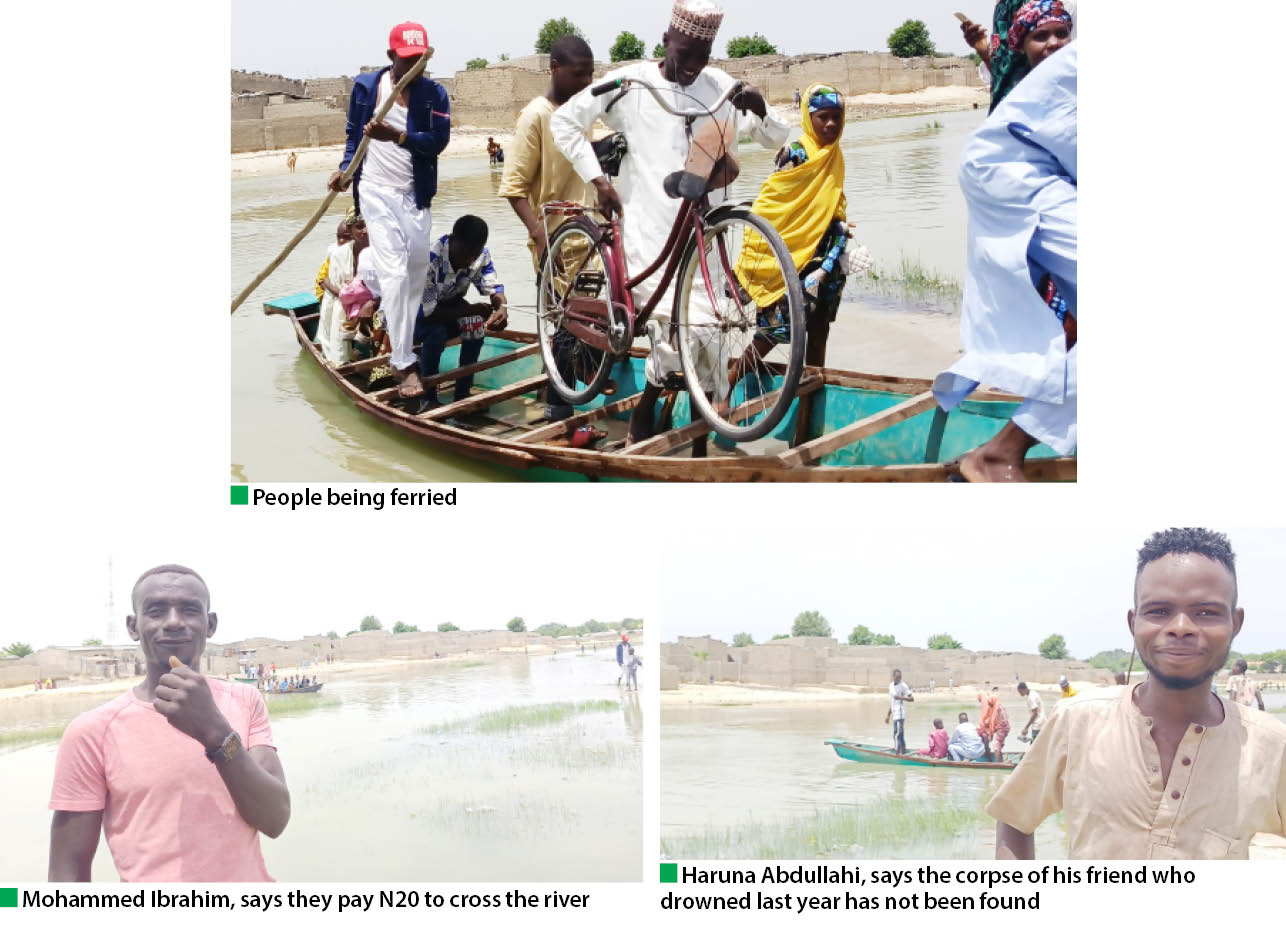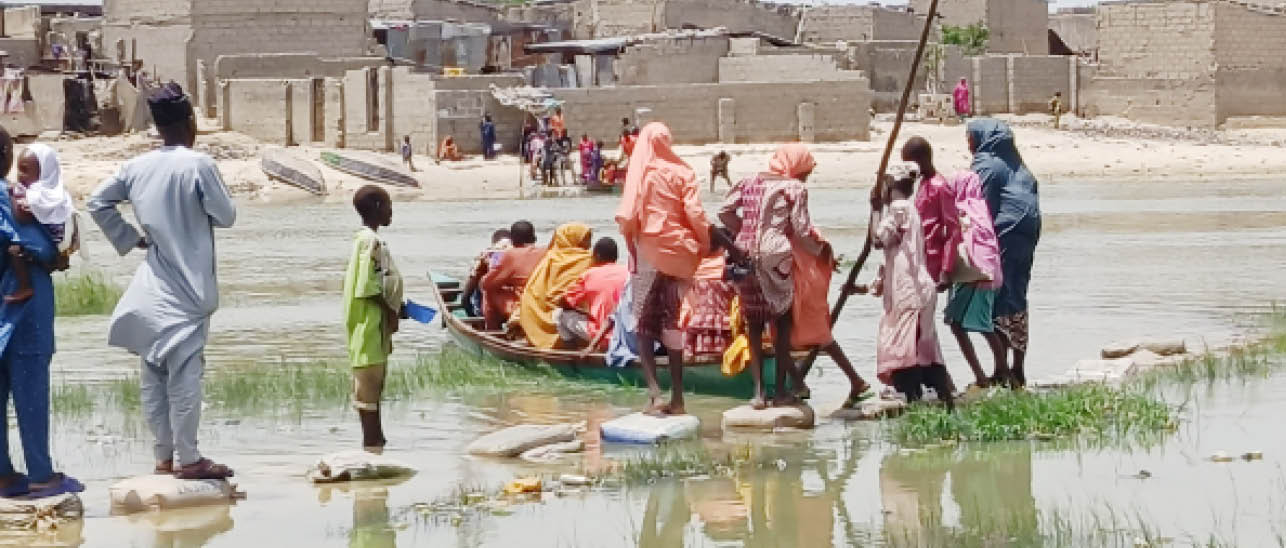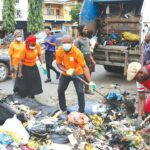Separated by a river from urban hustles, residents of Gwange Sabon-gari Gangare in Maiduguri, the Borno State capital, have to ride on boats to schools, markets and other places.
Standing by the riverbank, our correspondent watched people of different ages being ferried, each with a different mission to accomplish.
Both sides of the river were surrounded by heaps of garbage and sewage discharged into the moving water.
In the middle of the river, our correspondent saw children of school age swimming as the dirty water meandered and traversed a long stretch of the desert city.
- Why organisations should priortise mental health in workplaces – Pension operators
- Emefiele: Ex-NBA president, activists urge SSS to comply with court orders
Also, at the riverbank, some young men with no specific job lurk around, smoking marijuana (Indian hemp) openly, puffing a pungent odour smoke that pollutes the air.
“They live on that garbage heap, where those scrap metals are dumped. And it has been like this for decades. They roam freely, taking drugs and smoking weed (Indian hemp).
“The situation is getting bad every day because now, you will see a very small boy of not more than 10 years, smoking Indian hemp; and there is nothing anyone can do,” one of the residents lamented.
Mohammed Ibrahim, 45, who was born and brought up in the area, said that apart from the activities of miscreants, the river subjects the residents to different hardships and even death in some instances.
Ibrahim said that for almost 40 years he has been crossing the river, which occupies the area for four months but flows at its peak in August, to school, markets, and now, to his carpentry workshop
“We cross the river because the closest road that one can follow to Gidan Madara and Monday Market costs us between N200 and N300, but the ferryman only collects N20 and you will arrive at your destination on time, even before the person that pays much money to take the longest route.

“We all started like these children you see swimming. We learnt how to swim in this river and it is helping us to adapt to the hassles, situation and the environment. Therefore, we call on Governor Zulum to please construct a bridge for us,” he said.
Daily Trust on Sunday observed a cluster of ferry drivers who operate the wooden boats to earn a living from helping people to cross through. They struggle to ferry humans, animals and goods.
The leader of the ferry drivers, Haladu Muhammed, who owned three boats operating in the river, said they were into the business to help people and earn a living.
“You see, what we are doing here is a lawful business, and it is better than begging or stealing from people. We only charge N20 per person, but the fare was increased from N10 after the subsidy removal because of the increase in the price of wood and rubber used in constructing the boat,” he said.
While other people appealed to Governor Babagana Zulum to build a bridge that would save the community from the intermittent death, Muhammad pleaded that the river should be dredged and the banks reinforced to avoid overflow into the community.
“Using the boats will at least decongest our roads and save the poor residents from paying high transport fares to access markets and other business places in the town. It will also maintain the ferry job we do,” he said.
One of the ferrymen, Haruna Abdullahi, who lost a friend to the river last year, said the river usually claimed lives of residents whenever the rainy season set in due to an overflow of the river.
“I was with my friend, Yusufa Usman (may God have mercy on him) when the boat capsized and he drowned, and since then, not even his corpse has been recovered. In that season, we lost over 10 people I personally knew in this community,” he said.
Corroborating his claim, the North East coordinator, National Emergency Management Agency, Muhammad Usman, had told journalists that 15 corpses were recovered from the river on September 22, 2022.
Usman said cases of drowned people in the flooded river that affected many communities along its banks in Maiduguri had been on the increase.
He urged parents and guardians to caution their wards and children against swimming in the river to avoid drowning.
Residents complain of crimes, minimum basic amenities
Despite living in the heart of the capital city, residents in the area said they lived a hard life, minimum basic amenities and at the mercy of criminals.
One of the residents, Hauwa Umar, said they don’t have pipe borne water and all the schools their children are attending were far away from the area.
“The closest way to my children’s school is to cross this river, and we are not finding it easy ferrying them everyday.
“When our community leaders complained to the government to construct a bridge that would ease our suffering, they said we were living on waterways, so it was illegal.
“They threatened to demolish our houses and that’s why we decided to keep mute because if they chase us out, where do you think we would go?” she said.
However, the director-general of the Borno State Emergency Management Agency (SEMA), Hajiya Yabawa Kolo, said the agency had consistently ordered residents of Maiduguri metropolis to relocate to safer areas, especially the uplands, over imminent flooding.
Residents affected by the warning include those living on riverbanks and plains, comprising over a dozen communities in the state capital.
“There would be an imminent release of excess water from Alau Dam by the Chad Basin Development Authority CBDA),” explaining that the move is to prevent the facility from collapsing,” she said.
She said SEMA had been officially communicated by the CBDA on the exercise, observing that River Ngadda was full due to the torrential rains in the last month.
Kolo regretted the loss of 15 lives and the destruction of farmlands on the coast.

 Join Daily Trust WhatsApp Community For Quick Access To News and Happenings Around You.
Join Daily Trust WhatsApp Community For Quick Access To News and Happenings Around You.


